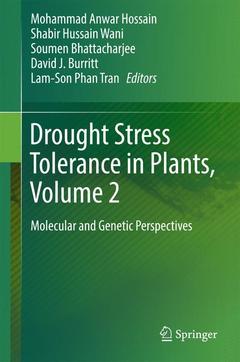Drought Stress Tolerance in Plants, Vol 2, 1st ed. 2016 Molecular and Genetic Perspectives
Coordonnateurs : Hossain Mohammad Anwar, Wani Shabir Hussain, Bhattacharjee Soumen, Burritt David J, Tran Lam-Son Phan

Drought is one of the most severe constraints to crop productivity worldwide, and thus it has become a major concern for global food security. Due to an increasing world population, droughts could lead to serious food shortages by 2050. The situation may worsen due to predicated climatic changes that may increase the frequency, duration and severity of droughts. Hence, there is an urgent need to improve our understanding of the complex mechanisms associated with drought tolerance and to develop modern crop varieties that are more resilient to drought. Identification of the genes responsible for drought tolerance in plants will contribute to our understanding of the molecular mechanisms that could enable crop plants to respond to drought. The discovery of novel drought related genes, the analysis of their expression patterns in response to drought, and determination of the functions these genes play in drought adaptation will provide a base to develop effective strategies to enhance the drought tolerance of crop plants. Plant breeding efforts to increase crop yields in dry environments have been slow to date mainly due to our poor understanding of the molecular and genetic mechanisms involved in how plants respond to drought. In addition, when it comes to combining favourable alleles, there are practical obstacles to developing superior high yielding genotypes fit for drought prone environments. Drought Tolerance in Plants, Vol 2: Molecular and Genetic Perspectives combines novel topical findings, regarding the major molecular and genetic events associated with drought tolerance, with contemporary crop improvement approaches. This volume is unique as it makes available for its readers not only extensive reports of existing facts and data, but also practical knowledge and overviews of state-of-the-art technologies, across the biological fields, from plant breeding using classical and molecular genetic information, to the modern omic technologies, that are now being used in drought tolerance research to breed drought-related traits into modern crop varieties. This book is useful for teachers and researchers in the fields of plant breeding, molecular biology and biotechnology.
Dr. Mohammad Anwar Hossain is a professor in the Department of Genetics and Plant Breeding, Bangladesh Agricultural University, Mymensingh-2202, Bangladesh. He received his B.Sc. in agriculture and M.S. in genetics and plant breeding from Bangladesh Agricultural University, Bangladesh. He also received an M.Sc. in agriculture from Kagawa University, Japan, in 2008 and a Ph.D. in abiotic stress physiology and molecular biology from Ehime University, Japan, in 2011. In November 2015 he moved to Tokyo University, Japan, as a JSPS postdoctoral scientist to work on isolating low phosphorus stress tolerant genes/QTLs from rice. He has published 25 research articles, 15 book chapters, and 5 review articles on important aspects of plant physiology and breeding, plant stress responses and tolerance mechanisms, and exogenous chemical priming-induced abiotic stress tolerance. Recently, he edited a book entitled Managing Salt Tolerance in Plants: Molecular and Genomic Perspectives published by CRC press, Taylor and Francis Group, USA. He has attended several international and national conferences for presenting his research findings. He is a professional member of the Bangladesh Society of Genetics and Plant Breeding, Bangladesh Association for Plant Tissue Culture and Biotechnology, and the Seed Science Society of Bangladesh.
Dr. Shabir Hussain Wani is an Assistant Professor in the Department of Genetics and Plant Breeding, Sher-e-Kashmir University of Agricultural Sciences and Technology of Kashmir, Srinagar, Jammu and Kashmir, India. He received his B.Sc. in Agriculture from BhimRao Agricultural University Agra, India and M.Sc. in Genetics and Plant Breeding from Central Agricultural University, Manipur, India and Ph.D. in Plant Breeding and Genetics on “Transgenic rice for abiotic stress tolerance” from the Punjab Agricultural University Ludhiana India. After obtaining his PhD he worked as Researc
International panel of experts discuss the impacts of drought stress on crops
Latest research development on the molecular and genetic mechanisms of drought tolerance
Insights into breeding strategies that confer drought resistance
Includes supplementary material: sn.pub/extras
Date de parution : 09-2016
Ouvrage de 604 p.
15.5x23.5 cm
Date de parution : 04-2018
Ouvrage de 604 p.
15.5x23.5 cm



